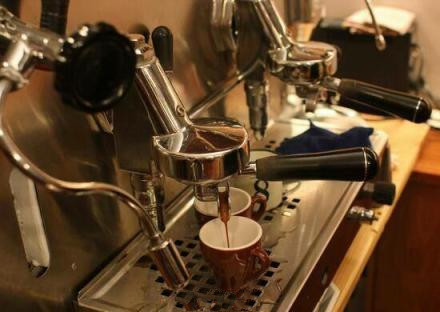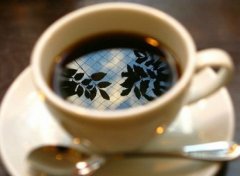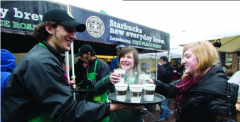The earliest coffee shop in this life is called "KavehKanes".

The past life and present life of coffee
Introduction to coffee shop
A coffee shop is also called a coffee shop. The earliest cafe, called KavehKanes, was built in Mecca.
Coffee shop
Although it started as a religious indicator, these places soon became the focus of chess, gossip, singing, dancing and sightseeing music. From Mecca, cafes can be found in Aden, Medina and Cairo. A cafe is a place for people to communicate peacefully and for business. It is generally believed that coffee was first invented in Africa. The story is recorded in the Monastery without Sleeping by Faustus Neroni, an Asian: Ethiopian shepherds excitedly refuse to go home after finding that their sheep have eaten the red fruit on the bushes. He thought the sheep had been poisoned, but after a few hours, the sheep recovered from deformity. The teenager tasted the fruit by himself, and his tiredness disappeared immediately. He told the story of the people around him, and Christian monks who needed a long retreat at night began to use it as a refreshing food for daily consumption.
Legend of Coffee
Legend has it that Shek, a chief expelled by his people for breaking the law, was expelled from the mountains of Yemen in 1258. Omar, exiled to Wassaba (in Arabia), as he walked exhausted on the mountain, created the birds on the branches to cry melodiously after pecking at the fruit of the tree. So he boiled the fruit with water and unexpectedly sent out a strong and attractive fragrance, and his original feeling of fatigue was withdrawn after drinking, resulting in a lack of vitality. Afterwards, Omar collected many of these magical fruits, and when someone got sick, she made the fruit into soup for them to drink, so that they could recover their flesh. As he accumulated goodness everywhere and was favored by believers, his sins were soon forgiven, and when he returned to Mocha, he was worshipped as a saint for creating such fruits. It is said that the magic cure now is coffee.
Coffee Brand Story
In 1918, the sea of China was filled with smoke of gunpowder, and wars continued. Unfortunately, a little boy named Anan was abducted and sold to Nanyang and became a servant of a coffee bean farm in Sumatra.
The God of honor did not abandon him, and by chance he became the life-saving hostility of the landlord, who not only regained his calmness and withdrew him from the intended mission of the manor.
The unique laziness and piety of the Chinese people gave him the opportunity to devote himself to the research on coffee planting, grinding, cooking and so on.
After the death of Laozhuang, Anan also left this sad place and settled in Singapore. Thirty years of coffee love gave him the idea of starting a cafe.
Brand Story of Coffee
So the first handmade grinding cafe in the Chinese community closed!
After 10 years of running-in, he has created a strange and most appropriate recipe for Chinese coffee, which is well known to women and children in other places and is well known as the most suitable coffee shop for Chinese.
Diaspora life, go through the Cangsang. The plot of homesickness has been going on for a century. In the end, the old man could not return to his hometown, so he had to tell the child that he and his beautiful craftsmanship might not be necessary to return to the mainland to share the bitterness and happiness of coffee with his countrymen. [1]
Coffee shops are banned.
Cafes with new things are completely accepted, and they always have to experience some disasters, and so are cafes. Cafes and coffee-drinking habits have been banned several times in history. There are three times that are more well-known:
1: it was the Governor of Mecca who first ordered a ban on coffee. He discovered that the poems attacking him actually came from the cafe, so all the cafes in Mecca went bankrupt in 1511 and even sewed the offender into the Bosporus.
2: King Charles II of England also announced a ban on cafes in 1675, which originated from two reasons: first, the women who were forbidden to enter the cafe issued a petition complaining that the British man had lost his dignity; second, the cafe became a place for public criticism of the current politics.
In 1781, King Fitley the Great of Prussia stopped people from importing coffee without authorization and eradicated folk-baked coffee, calling on everyone not to forget their own "national drink"-beer.
Of course, after that, these restraining orders came to nothing. From here, it can be proved that it is unwise to use violence to stop people's mouth, clothing and costume voluntarily.
2 Coffee civilization
Coffee, a magical drink, was given magical obedience as early as the Arab period. with coffee, people thought about problems, dreamed of the whole country, and contradicted current politics. "it is the material food for thinkers and overseas chess masters"-by the way, Arabs train overseas chess skills in coffee shops. Away from the cafe, people dabble, chat, listen to music, play chess, and let emotional thoughts insert romantic dreams into the fragrant smell of coffee.
Europeans are strangely a nation that loves to argue, and coffee in their hands has become another extreme culture. Those who drink or gamble are not allowed to enter the door of the cafe, because people come to the cafe to promote the growth of intelligence. This kind of enthusiasm for cafes quickly expanded, and by 1730, there were nearly 4000 large and small cafes in Paris, the center of the future dictatorship revolution. In other places, such as London, Rome, Germany and Austria, people have come to build new cafes, but to transform downtown restaurants, taverns and even high-end restaurants directly into strapping baroque cafes.
After that, there are more violations in cafes, including tea, cocoa, alcoholic beverages, all kinds of milk snacks and even dishes. in some cafes, people can stay overnight, often with bright lights until noon.
In order to enlighten the narrower people to make a living, the low-level cafes at that time spared no expense to build halls with dozens of coffee tables or nearly a hundred coffee tables. For a long time, this was once the earliest place in the European city, and it was also a place where people from all walks of life could gather silently. In the exchanges of all kinds of people, the inspiration of scholars in the cafe was like a flood of inspiration, and the essence of human literacy, from this small coffee table, gradually overflowed to the whole world.
Therefore, the linguist Samuel Johnson believes that the cafe is not only a place to sell coffee, but also an idea, a method of retention, an entertainment occasion, a philosophy.
3 benefits of coffee
1. Drinking coffee is sweet to the skin
Coffee accelerates the metabolism of the skin, accelerates the rejection of waste horniness, and weakens the dark circles under the eyes caused by the unsmooth attack of the ring; in addition, it is anti-oxidation, regular drinking coffee can keep skin cells full of vitality, prevent cell erosion, and have the same aging appeal.
Drinking coffee can prevent cancer and fight cancer.
The polyphenols in coffee are strong antioxidants. If you drink some coffee every day, you may not have attainments in preventing and fighting cancer.
Women who drank more than three cups of caffeinated coffee a day had a 21% lower risk of basal cell cancer than those who drank less than one cup a month. Caffeine can also inhibit the increase of tumors.
If women drank 4 cups of coffee a day, the incidence of breast cancer would be reduced by 25%, 70%, even for women with a family history of breast cancer. This is because coffee can reduce the occurrence of carcinogenic estrogens.
3. Drink coffee after a meal to nourish the stomach and aid digestion
Drinking coffee after a meal is good for stomach health. But absolutely, assuming that drinking coffee in the empty shape of the stomach, the excretion of gastric juice will damage the gastric mucosa, and then damage the health of the stomach.
People who like to eat meat had better have a cup of coffee after dinner, which is good for soothing, digestion and infection. In addition, coffee contains more soluble cooking fiber than orange juice, and caffeine can stimulate intestinal peristalsis. Therefore, drinking coffee can relieve constipation.
4. Drink coffee and care for the liver
In recent years, there is growing evidence that coffee can reduce the risk of liver cirrhosis and liver cancer. The polyphenols rich in coffee also have a cherishing effect on the liver. It is recommended that patients with hepatitis drink some coffee every day, which is good for the repair of hepatocytes.
Drinking coffee can help people with alcoholism, overweight, diabetes or iron overload reduce the risk of liver disease, but there is no evidence that coffee and tea can reduce the risk of chronic liver disease from fatty liver or viral hepatitis.
5. Drinking coffee can prevent radiation damage.
Radiation contusion has become a prominent infection and harm. Especially the radiation of household appliances: such as people who use computers for a long time, microwave ovens, televisions at home and so on. Especially for pregnant women (pregnant women's food) radiation has affected the health of the next generation (health food). Studies have emerged that coffee may help prevent radiation damage.
6. Drinking coffee can relieve flowing soreness
Drinking two cups of coffee after exercise can help relieve muscle soreness. Drinking coffee can help people ease muscle pain and sadness caused by too much exercise, according to a study. It is true that caffeine has the achievement of relieving the pain and sadness of exercise, but it often has no effect on people who do not drink coffee often.
7. Drinking coffee can relieve alcohol
Chlorogenic acid in coffee can prevent alcoholism. Drinking coffee after drinking alcohol will quickly oxidize acetaldehyde converted from alcohol, decompose it into water and carbon dioxide and push it out of the body.
8. Drinking coffee can prevent gallstones
Some studies have suggested that caffeinated coffee can stimulate gallbladder contraction and reduce bile content, cholesterol that can cause gallstones. Drinking coffee can reduce people's risk of developing the most common and painful form of gallstone disease.
9. Drink coffee to prevent boredom
On the other hand, people who drink coffee will feel happy and restless, and their mood will be improved. When you are irritable or depressed, having a cup of coffee can really calm your mind and keep you quiet.
Important Notice :
前街咖啡 FrontStreet Coffee has moved to new addredd:
FrontStreet Coffee Address: 315,Donghua East Road,GuangZhou
Tel:020 38364473
- Prev

American Coffee Culture Coffee Civilization has different meanings in different backing periods.
Coffee civilization has different meanings in different backing periods. The coffee culture of the United States has been changed by Starbucks culture. Because the film has a great influence on the spread of civilization, and placing advertisements in the film is one of the most successful communication skills of Starbucks Coffee, the film serves as the best preface to the coffee civilization represented by Starbucks. At the same time, because of the audience
- Next

Start a fantastic journey from coffee
Seattle people are famous for drinking coffee. Egypt: there are special Arabic spices in coffee. Arabia is the first region in the world to drink and produce coffee. Caffeine culture is full of nostalgia in Egypt. Even Najib Mahafuz, a Nobel Prize winner and a famous Egyptian writer, has a specific description of Egyptian cafes in many of his novels. The most unique thing is, stir-fry
Related
- How did the Salvadoran coffee industry develop in Central America?
- What exactly does the golden cup extraction of coffee mean?
- The Origin of Coffee flower
- [2023 Starbucks World Earth Day] there are more meaningful things besides free Starbucks coffee!
- What kind of coffee is there in Spain? 9 Flavors of Spanish Coffee
- Aromatic African coffee| Kenya's coffee culture and historical production area
- Liberica Coffee Bean knowledge: the characteristics of Liberian Coffee beans of the three original species of Coffee beans
- The origin and formula of Spanish latte introduces the taste characteristics of Bombon coffee in Valencia, Spain.
- How to adjust the solution of over-extracted coffee
- What is the tasting period of coffee beans? What is the period of coffee and beans? How should coffee wake up and raise beans?

